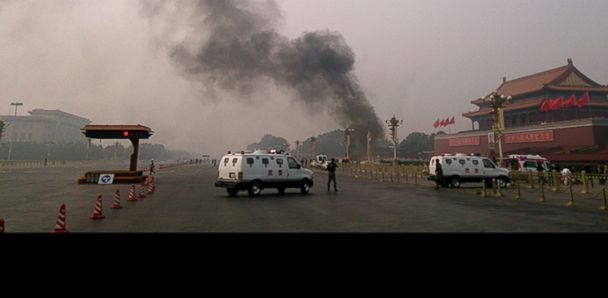Beijing Calls Tiananmen Crash 'Terrorist Act,' Detains Five

STR/AFP/Getty Images
BEIJING - Two days after a deadly fiery car crash in Beijing's Tiananmen Square, Chinese authorities officially called it as an "organized, premeditated violent terrorist act."
On Monday, a Jeep carrying three passengers plowed through groups of tourists and burst into flames right in front of Beijing's famed Tiananmen Gate where the portrait of Mao Zedong hangs over the iconic square.
The crash killed five, including the three passengers, and injured 40, many of them tourists.
For days the state media and the government called it an accident and stayed largely silent, even censoring images and mention of the smoldering wreckage on Chinese social media.
On Wednesday evening right before the national evening news, CCTV and the state-run news agency Xinhua announced that five suspects are detained in connection with the "terrorist act."
"With the cooperation of police authorities including those in northwest China's Xinjiang Uygur Autonomous Region, Beijing police have captured five suspect who had been at large," Xinhua quoted a Beijing police spokesperson.
The three people who died in the Jeep were all Uighurs, the Muslim minority group from the restive Xinjiang region of China. Xinhua reported that the driver Usmen Hasan, his mother Kuwanhan Reyim and his wife Guliz Gini plowed through the crowd, crashed into the guardrail next to the moat of the Forbidden City, and then lit themselves on fire with gasoline.
The Beijing police said that they found "equipment full of gasoline, two knives and steel sticks as well as flag with extremist religious content" in the wreckage of the Jeep.
Police also claimed to have found more knives and at least one "jihadi" flag at where the five detained suspects where staying in Beijing.
According the Xinhua report, the police claimed that the men admitted that they knew the driver Hasan and that they had conspired to carry out the attack.
The Xinjiang region, where the police say the suspects are from, has a history of tit-for-tat violence between the Uighurs and the Han Chinese. Many the majority Uighur community there balk at the growing Han influence and central government controls in the region. The Han Chinese blame Uighur extremists for attacks that taken place in Xinjiang.
The ethnic violence, up until this point, has largely been contained within the Xinjiang region